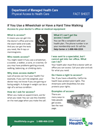Health plans must provide you with access to health care services you need, including preventive care and necessary services for your disability. The Department of Managed Health Care (DMHC) has published the following educational materials to help Californians with disabilities understand their rights and get the care they need.

Physical Access to Care
If you use a wheelchair or have a hard time walking, you must have access to your doctor’s office or medical equipment.
Link to fact sheet: Physical Access to Care
When You Apply for Health Insurance
A group health plan, which you get through your job, cannot charge you more or refuse to cover you if you have a disability.
An individual health plan cannot refuse to insure a person based on the person's health history, also known as pre-existing conditions. It also cannot deny you insurance just because you have a physical or mental disability.
You Have the Right To:
- Accessible and usable medical equipment at a provider's office or facility. For example, your doctor or health plan should help you find accessible weight scales, exam tables, and diagnostic medical equipment such as mammography and MRI.
- Have most physical barriers removed that make it hard for you to use your health care services.
- Extra time for visits, if you need it.
- Health information you can use if you are blind, deaf, or have low vision.
- Take your service animal into exam rooms with you.
Getting the Services You Need
If you disagree with your health plan about what you need, you can file a complaint with your plan.
You or your doctor can ask for changes in the way services are offered. For example, you may need someone with special training to draw your blood. Your health plan must cover these services if there are medical reasons why you need them.
Durable Medical Equipment (DME)
DME is medical equipment that can be used again, such as hospital beds and wheelchairs. Health plans do not have to cover most DME. If they do cover DME, they only pay for equipment you medically need, like a wheelchair if you cannot walk or oxygen if you have trouble breathing.
You may have to pay part of the cost.
You have to get prior approval from the plan before you get the equipment.
Before you join a plan, ask if it covers the equipment you need and what the cost is.
Communicating with DMHC
The DMHC is committed to providing you with accessible communication. Please use the link below to contact the DMHC Disability Coordinator to request materials in an alternate format or to ask questions.
Other Resources
CA Civil Right's Department
Federal Guide to Disability Rights Laws
(The links to third-party websites provided on DMHC's website are for convenience and informational purposes only. DMHC does not control these external sites and is not responsible for their content or accuracy.)